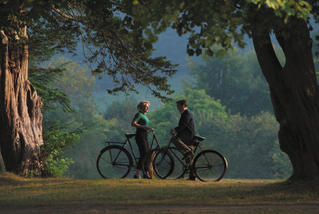What do you think of when you hear the word
spiritual? Do you know any spiritual people? What do you imagine they might be like? Always thinking about God? Studying their Bibles regularly? Attending church every week? Praying freqently? Wise? Living according to good health principles? Have an aura of goodness about them? Have you ever tried to live up to these notions of spirituality with any success? If you are like me, you might have tried for a while, but in the end, living up to all the expectations surrounding this type of spirituality is hard to sustain. All of these things are good. But are they what true spirituality is really about? Or have you come to the conclusion that spirituality is only for the elite? That you just don't seem to be cut out for it?
Mike Yaconelli suggest that we might have spirituality all wrong. In his wonderful book,
Messy Spirituality: Christianity for the rest of us, he provides a superbly grace-oriented understanding of real spirituality that makes sense in the messy everyday of our lives. For Yaconelli, 'our messy, ordinary lives are the very place we are most likely to find God and deepen our knowledge of him.' (Back Cover)
Messy Spirituality is a brief book (only 163 pages) but every sentence is dripping with a freshness that will renew your heart and convince you that God does not demand we ignore or transcend the messiness of real life. No, God loves us and meets us exactly where we are. God loves messy people with messy lives in messy circumstances. If you want a spirituality that is
real then you owe it to yourself to read this book.
Quote
'What landed Jesus on the cross was the preposterous idea that common, ordinary, broken, screwed-up people
could be godly! What drove Jesus' enemies crazy was his criticism of the 'perfect' religious people and his acceptance of the imperfect non-religious people. The shocking implications of Jesus' ministry is that anyone can be spiritual.
'Scandalous? Maybe.
'Maybe Truth
is scandalous. Maybe the scandal is that all of us are in some condition of not-togetherness, even those of us trying to be godly. Maybe we are all a mess -- not only sinful messy, but inconsistent messy, up-and-down messy, now-I-believe-now-I-don't messy, I-get-it-now-I-don't-get-it messy, I-understand-uh-now-I-don't-understand messy.
I admit, messy spirituality sounds ... well ...
un-spiritual.
'Surely there are guidelines to follow, principles to live by, maps to show us where to go to discover a spirituality that is clean and tidy?
'I'm afraid not.
'Spirituality is not a formula, it is not a test, it is a relationship. Spirituality is not about competency, it is about intimacy. Spirituality is not about perfection, it is about connection. The way of the spiritual life begins where we are now in the mess of our lives. Accepting the reality of our broken flawed lives is the beginning of spirituality, not because the spiritual life will remove our flaws but because we
let go of seeking perfection and, instead, seek God, the One who is present in the tangled-ness of our lives. Spiritualityis not about being fixed, it is about God being present in the mess of our unfixedness.' (pp 5-6)
Related Links
- As I was browsing the internet to look for related links, I came across this one at Christianity Today reporting on the death of Mike Yaconelli, the author. This book was first published in 2001 and Mike died in 2003. You can read this article about Mike and see for yourself what sort of a man Mike was. I was very sad to read this after reading his book.


 The factory is brilliantly rendered, and Johnny Depp is the standout star in this movie and is perfectly zany in the role. The kids are all suitably obnoxious except for Charlie who is a sickingly nice role model for all children everywhere. It's a fun movie with an overt moral message -- although I'm not sure I could live for long with a child as perfect as Charlie!
My Rating: ***1/2 (out of 5)
Positive Review
'Those Oompa-Loompas are the beat, and soul, of Burton's finest movie since "Ed Wood": a madhouse kiddie musical with a sweet-and-sour heart.' -
The factory is brilliantly rendered, and Johnny Depp is the standout star in this movie and is perfectly zany in the role. The kids are all suitably obnoxious except for Charlie who is a sickingly nice role model for all children everywhere. It's a fun movie with an overt moral message -- although I'm not sure I could live for long with a child as perfect as Charlie!
My Rating: ***1/2 (out of 5)
Positive Review
'Those Oompa-Loompas are the beat, and soul, of Burton's finest movie since "Ed Wood": a madhouse kiddie musical with a sweet-and-sour heart.' -